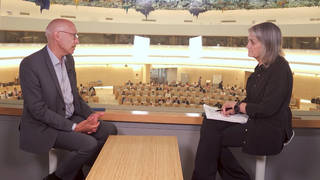The United States recorded more than 80,000 new coronavirus infections Wednesday and over 1,000 new deaths, as the White House Coronavirus Task Force warned in an internal report of “unrelenting, broad community spread in the Midwest, Upper Midwest and West.” Every state in the union is either holding steady or seeing an increase in new cases, with the U.S. headed for a third surge that’s set to rival two previous peaks.
On the campaign trail, President Trump continues to rally his supporters at packed events where few people wear masks. On Wednesday, Trump traveled to Arizona, where he mocked a statewide mask mandate ordered by California Governor Gavin Newsom.
President Donald Trump: “In California, you have a special mask. You cannot, under any circumstances, take it off. You have to eat through the mask.”
Trump’s remarks came as a new study by Vanderbilt University researchers found coronavirus hospitalizations rose dramatically in places without a local mask mandate compared to places where a large majority of people wore face coverings in public. On Wednesday, top infectious disease scientist Dr. Anthony Fauci made his strongest comments yet in favor of a nationwide mask mandate.
Dr. Anthony Fauci: “Let’s put aside these extraordinary excuses for not doing it, when we’re dealing with a situation that’s not trivial. You know, we have 225,000 deaths. The modeling tells us we’re going to get a hundred or more thousand as we get into the winter. That is just something that’s unacceptable.”
Meanwhile, new audio has emerged of President Trump’s son-in-law and senior adviser Jared Kushner bragging about Trump’s decision to ignore the advice of his top public health officials early in the pandemic. Kushner was speaking with journalist Bob Woodward on April 18.
Jared Kushner: “You know, it was almost like Trump getting the country back from the doctors, right? In the sense that what he now did was, you know, he’s going to own the open-up.”
Last week, a study in the journal Nature Medicine found universal mask wearing across the U.S. could save nearly 130,000 lives by the end of next February.










